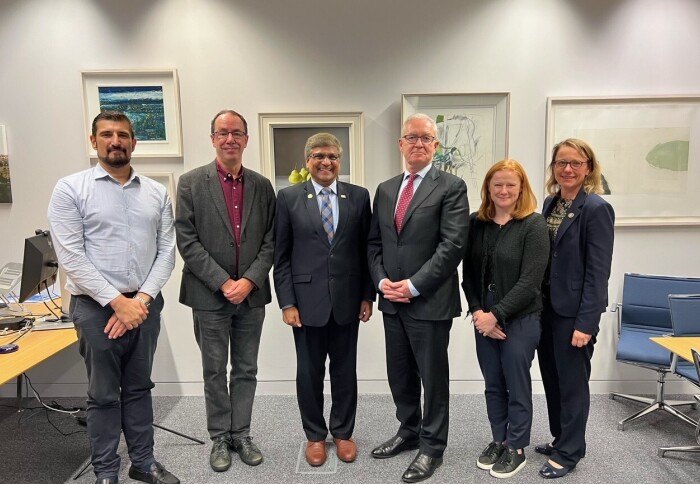Imperial-led project to develop global standards for biofoundry development

Funding from the US National Science Foundation Global Centers programme will support work at Imperial to improve biofoundry development.
The National Science Foundation (NSF) and partner agencies in the UK, US, Canada, Finland, Japan, and the Republic of Korea have announced new funding awards of nearly $82 million (£62 million) for the 2024 Global Centers, which will focus on advancing bioeconomy research to tackle global challenges, such as climate change, food security, and healthcare.
The global bioeconomy uses biotechnology and biomass to develop goods, services, and energy, using biological resources from nature, such as plants, animals and microorganisms, to support sustainable economic development. Biofoundries are facilities that provide tools and equipment needed for engineering biology research – a process of turning synthetic biology discoveries into real-world applications.
"A global bio-based bioeconomy is essential if we are to remove our dependence on petrochemicals which cause large amounts of harmful pollution and contribute to carbon emissions." Professor Paul Freemont Department of Infectious Disease
Imperial’s project will bring together expertise from seven biofoundries in five countries to establish a Global Center for Biofoundry Applications (GCBA). The GCBA will focus on developing standards and metrics to make biofoundries reliable and scalable to accelerate the global bioeconomy.
Professor Paul Freemont, Imperial’s lead researcher for the project, from the Department of Infectious Disease, said: “A global bio-based bioeconomy is essential if we are to remove our dependence on petrochemicals which cause harmful pollution and contribute to carbon emissions.
“This international collaboration on biofoundries will not only accelerate biotechnology development, but will also allow cooperation and sharing of best practices, and enhance the global community of public-funded biofoundries”
Many countries have set up public-funded biofoundaries in recent years to accelerate the development of engineering biology research and applications in areas such as food, healthcare and energy.
However, a lack of global standards and consistent metrics presents a major challenge for the rapid growth and wide adoptions of biofoundries in industry and academia.
The GCBA aims to address this problem by allowing best practices to be shared between biofoundaries and for the transparent development of open technical standards and metrics.

Deepening US collaboration
To mark the new funding, Professor Hugh Brady, President of Imperial, met the NSF’s Director Sethuraman Panchanathan at Imperial’s South Kensington Campus to discuss their collaborative work and the progress of previous NSF-funded Global Centers which are led by Imperial. Professor Brady also shared the university’s plans for deepening its collaboration with the US, particularly through the new Imperial Global USA hub in San Francisco.
In 2023, Imperial received funding from NSF to launch the Electric Power Innovation for a Carbon-free Society (EPICS) Center to support the development of a power grid using 100 per cent renewable energy.
The university is also a member of the NSF-funded Global Hydrogen Production Technologies Center (HyPT) which is working on major technologies for net zero hydrogen production.
Bringing together global expertise
NSF’s Global Centers programme for 2024 aims to solve global challenges through bioeconomy research, working in areas such as increasing crop resilience and converting plant matter or other biomass into fuel.
"The Global Centers are leveraging expertise and resources across like-minded nations and uniting multidisciplinary teams from around the world to accelerate innovations in the bioeconomy for great impact." Sethuraman Panchanathan Director of the National Science Foundation
The programme supports multidisciplinary research that brings together international teams and scientific disciplines. All the new Centers will integrate public engagement and workforce development, paying close attention to impacts on communities.
NSF Director Sethuraman Panchanathan said: “The Global Centers are leveraging expertise and resources across like-minded nations and uniting multidisciplinary teams from around the world to accelerate innovations in the bioeconomy for great impact.
“Together, we are forging new solutions to pressing socioeconomic challenges while creating international centers of research excellence that are generating crucial knowledge, empowering communities and strengthening the foundations of global cooperation.”
The UK’s main partner agency for the programme is the UK Research and Innovation Biotechnology and Biological Sciences Research Council (BBSRC), part of UK Research and Innovation (UKRI).
Professor Dame Ottoline Leyser, CEO of UKRI, said: “Alongside replacing fossil fuels, there is an urgent need to replace petrochemical industrial feedstocks across a wide range of sectors. This is a global challenge that requires global solutions and UKRI is delighted to be partnering in the NSF Global Centers 2024 programme to meet this need.
“The announcement today will be at the forefront of real-world solutions, from improved recycling to new bioplastics, building a sustainable circular economy. The centers will create the global networks and skills needed to drive a thriving bioeconomy benefitting all.”
--
The seven biofoundries participating in the Imperial-led project are:
- The London Biofoundry (LBF) at Imperial
- The Illinois Biological Foundry for Advanced Biomanufacturing at the University of Illinois at Urbana-Champaign, USA
- The US Department of Energy’s Agile BioFoundry (ABF), USA
- The National Institute of Standardization and Technology’s Living Measurement Systems Foundry, USA
- The Finnish BioFoundry for Advanced Biomanufacturing at VTT Technical Research Centre, Finland
- The KobeBioFAB at the Kobe University, Japan
- The Korea Biofoundry at the Korea Research Institute of Bioscience and Biotechnology, Republic of Korea
Article text (excluding photos or graphics) © Imperial College London.
Photos and graphics subject to third party copyright used with permission or © Imperial College London.
Reporter
Conrad Duncan
Communications Division